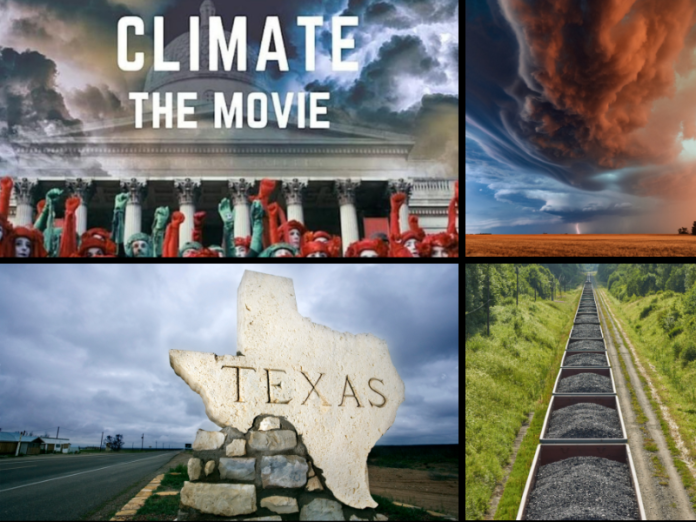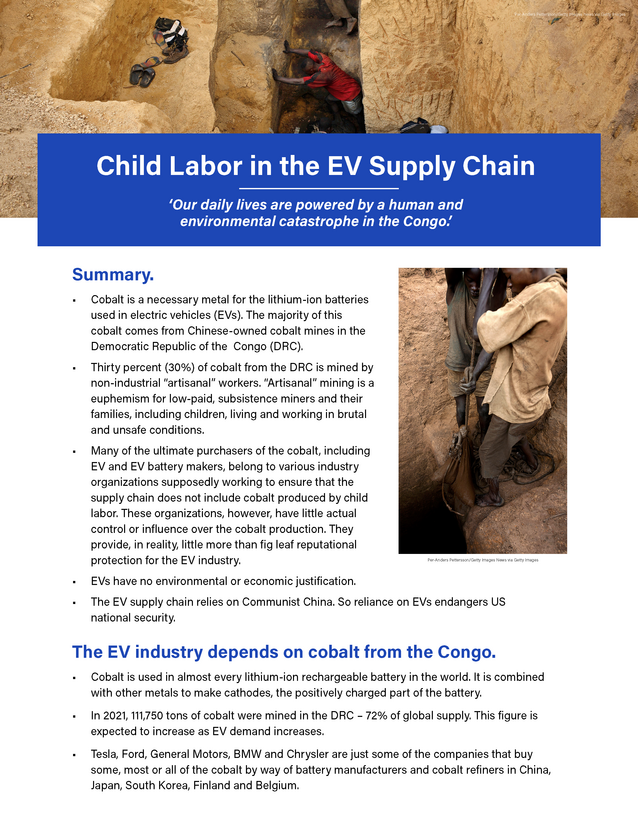YOU SHOULD SUBSCRIBE TO CLIMATE CHANGE WEEKLY.
IN THIS ISSUE:
- Stream Climate: The Movie Before It’s Censored
- Video of the Week: Climate: The Movie – The Climate Realism Show #103
- Weather Extremes Are Little Changed, New Report Shows
- Carbon Dioxide Emissions Keep Increasing on Growing Coal Use
- Texas Removes Billions from BlackRock Control Over Climate Policies
- Podcast of the Week: Renewable Power Costs More and Delivers Less (Guest: Isaac Orr)
- Climate Comedy
- Recommended Sites
Watch ALL the Presentations by the ALL-STARS of Climate Realism at the Archive of Heartland’s 15 Climate Conferences
Stream Climate: The Movie Before It’s Censored
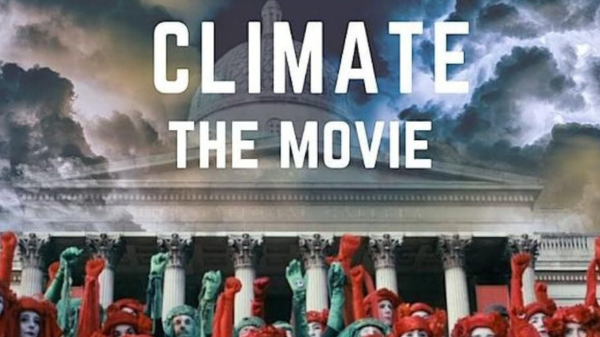
Editor’s Note: Climate: The Movie premiered in Europe, the U.K., and the United States on March 19. Nobel Prize-winning physicist John Clauser attended the premier in Washington, D.C., and there was an audience of more than 500 in attendance in London. I viewed the movie online and think it would be more appropriately titled, “Climate Change: Case Closed,” or alternately, “Climate Change: Debate Over, There Is No Crisis.” It’s a powerful indictment of the climate cabal profiting in terms of money, resources, and power by promoting catastrophic climate claims, evidence to the contrary.
The movie is brought to the public by noted documentary producer/director Martin Durkin, who previously produced award-winning programs for the Discovery Channel, National Geographic, and the Science Channel, among many other outlets. We at Heartland were honored to host noted podcaster Thomas Nelson, who co-produced the program, on the 103rd edition of the Climate Realism Show, on March 22.
The movie features discussions from multi-award-winning climate researchers. The Climate Intelligence group Clintel is translating the program into French, German, Spanish, Italian, Dutch, Polish, Hungarian, and Danish, and it has already received glowing reviews in The Telegraph and the Epoch Times, as well as on dozens of popular blogs and podcasts. The mainstream media, remaining as inimical to climate realism firmly grounded in facts as ever, is trying to ignore the documentary. They can try, but I think they’ll fail, based on the fact that, as I write, the film has already garnered more than 137,000 viewers on YouTube, with more than 6,800 likes, and about 1,500 comments.
Having said that, I don’t doubt that there will be moves to have Climate: The Movie removed from or censored by YouTube, BitChute, Rumble, Twitter, Vimeo, Substack, Spotify, and Telegram, and the other online platforms where it can, for now, be viewed. I suggest you watch it before it is removed from viewing or slapped with warning labels making it inaccessible. Rather than try and describe it myself, Thomas Nelson allowed me to pull his and Durkin’s description of the program from the former’s substack channel. I’ll let them speak for themselves.
About Climate: The Movie (The Cold Truth) by Director Martin Durkin and Producer Tom Nelson
This film exposes the climate alarm as an invented scare without any basis in science. It shows that mainstream studies and official data do not support the claim that we are witnessing an increase in extreme weather events—hurricanes, droughts, heatwaves, wildfires, and all the rest. It emphatically counters the claim that current temperatures and levels of atmospheric CO2 are unusually and worryingly high. On the contrary, it is very clearly the case, as can be seen in all mainstream studies, that, compared to the last half billion years of Earth’s history, both current temperatures and CO2 levels are extremely and unusually low. We are currently in an ice age. It also shows that there is no evidence that changing levels of CO2 (it has changed many times) has ever ‘driven’ climate change in the past.
Why then, are we told, again and again, that ‘catastrophic man-made climate-change’ is an irrefutable fact? Why are we told that there is no evidence that contradicts it? Why are we told that anyone who questions ‘climate chaos’ is a ‘flat-earther’ and a ‘science-denier’?
The film explores the nature of the consensus behind climate change. It describes the origins of the climate funding bandwagon, and the rise of the trillion-dollar climate industry. It describes the hundreds of thousands of jobs that depend on the climate crisis. It explains the enormous pressure on scientists and others not to question the climate alarm: the withdrawal of funds, rejection by science journals, social ostracism.
But the climate alarm is much more than a funding and jobs bandwagon. The film explores the politics of climate. From the beginning, the climate scare was political. The culprit was free-market industrial capitalism. The solution was higher taxes and more regulation. From the start, the climate alarm appealed to, and has been adopted and promoted by, those groups who favor bigger government.
This is the unspoken political divide behind the climate alarm. The climate scare appeals especially to all those in the sprawling publicly-funded establishment. This includes the largely publicly-funded Western intelligentsia, for whom climate has become a moral cause. In these circles, to criticize or question the climate alarm has become a breach of social etiquette.
The film was shot on location in the U.S., Israel, Kenya, and the UK.
The film includes interviews with a number of very prominent scientists, including Professor Steven Koonin (author of ‘Unsettled’, a former provost and vice-president of Caltech), Professor Dick Lindzen (formerly professor of meteorology at Harvard and MIT), Professor Will Happer (professor of physics at Princeton), Dr. John Clauser (winner of the Nobel prize in Physics in 2022), Professor Nir Shaviv (Racah Institute of Physics), and others.
Sources: Climate: The Movie; The Climate Realism Show, Tom Nelson’s Substack.
Click to watch on YouTube, BitChute, Rumble, Twitter, Vimeo, Substack, Spotify, and Telegram. Or watch below:
NEW: Get Climate at a Glance on your mobile device!
Video of the Week
Climate Change Roundtable is now The Climate Realism Show. The same great climate news and analysis from The Heartland Institute’s world-class climate and energy experts, but a snazzy new name that gets right to the heart of what it is about.
On episode 103 of The Climate Realism Show, we welcome Tom Nelson, producer of the new film “Climate: The Movie.” The film exposes the climate alarm as an invented scare without any basis in science. It emphatically counters the claim that current temperatures and levels of atmospheric CO2 are unusually and worryingly high.
The Heartland Institute’s Anthony Watts is host, H. Sterling Burnett and Linnea Lueken break down the movie and its impact with Nelson. Plus, we also have our regular weekly feature, Crazy Climate News – where we look at some of the most absurd climate alarmism stories of the week.
Read the brutal truth about how battery production for electric vehicles cause immense environmental destruction and human tragedy.
Weather Extremes Are Little Changed, New Report Shows
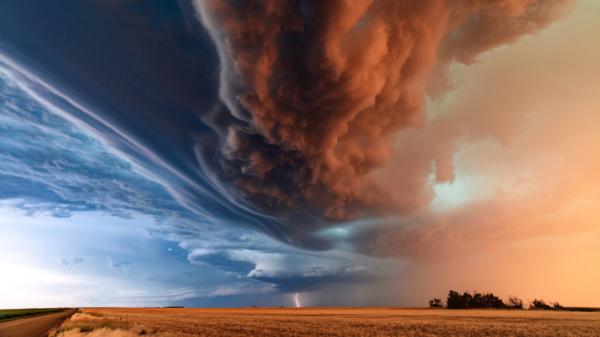
A new report published by The Global Warming Policy Foundation (GWPF) debunks oft-made claims that extreme weather, such as droughts, floods, heatwaves, hurricanes, tornadoes, and wildfires, have become more common and more intense in recent decades as a result of human caused climate change.
Written by physicist Ralph Alexander, Ph.D., it presents long-term observational data and historical newspaper accounts of weather to “document multiple examples of past extremes that matched or exceeded anything experienced in the present-day world,” as Benny Peiser, Ph.D., director of the GWPF, writes in in an article on Climate Change Dispatch.
In the paper’s executive summary, Alexander writes brief descriptions of some of the conclusions presented in the report, such as:
Heatwaves of the last few decades pale in comparison to those of the 1930s—a period whose importance is frequently downplayed by the media and environmental activists. The evidence shows that the record heat of that time was not confined to the U.S. ‘Dust Bowl’, but extended throughout much of North America, as well as to other countries, such as France, India, and Australia.
Major floods today are no more common nor deadly or disruptive than any of the thousands of floods in the past, ….
Severe droughts have been a continuing feature of the Earth’s climate for millennia, despite the brouhaha in the mainstream media over the extended drought in Europe during the summer of 2022. Not only was the European drought not unprecedented, but there have been numerous longer and drier droughts throughout history, including during the past century.
“That so many people are unaware of past extremes shows that collective memories of extreme weather are short-lived,” Alexander told Peiser, describing why he wrote the report. “The perception that extreme weather events are increasing in frequency and severity is primarily a consequence of new information technology—the Internet and smartphones—which have revolutionized communication and made us much more aware of such disasters in all corners of the world than we were 50 or 100 years ago … amplified by the mainstream media, eager to promote the latest climate scare.”
Sources: Climate Change Dispatch; The Global Warming Policy Foundation
Heartland’s Must-read Climate Sites



Carbon Dioxide Emissions Keep Increasing on Growing Coal Use
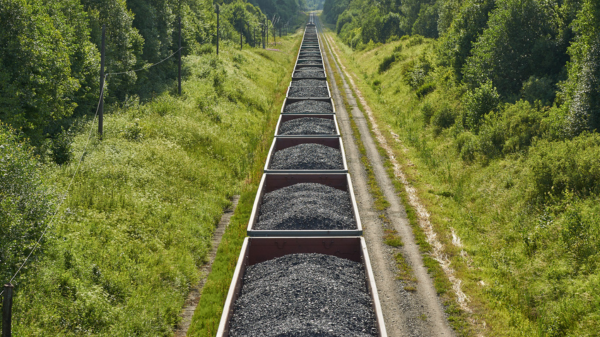
Despite commitments by many countries to reduce carbon dioxide emissions (CO2), the International Energy Agency (IEA) says that global CO2 emissions from energy use kept growing in 2023, setting new records.
Citing the IEA, Energy World reports that global CO2 emissions from the energy sector increased by 1.1 percent in 2023, “rising by 410 million tons to set a new all-time high of 37.4 billion tons.” 2023’s emissions increase was slightly lower than the global energy emissions increase in 2022 of 1.3 percent.
Rumors of coal’s death have been greatly exaggerated, and the IEA estimates that more than 65 percent of the growth in emissions was from an increase in coal’s use for electric power production.
As has been the norm for a while, China led the way in emissions increases, experiencing the largest emissions increase globally in 2023. This came even as China’s gross domestic product and productivity growth rates slowed. With its rapid emissions’ growth over the past decade and a half, Energy World reports that China’s per capita emissions are now 15 percent higher than those in developed or industrialized nations.
China was not alone in contributing to the global rise in emissions. Energy World reports that India’s strong economic growth in 2023 was largely powered by an in increase in coal use. India’s emissions grew by approximately 190 million tons in 2023.
Of course, this data only covers emissions from the power sector. Industrial and transportation emissions are also likely to have increased in 2023.
Source: Energy World
Texas Removes Billions from BlackRock Control Over Climate Policies

Texas passed laws a couple of legislative sessions ago to discourage banks and large investment management firms from jeopardizing their investors’ returns by making Environment, Social, and Governance (ESG) goals, rather than profit, central to their investment strategies and business operations, telling the firms they should put profits above political and social posturing when handling other peoples’ money and making financial decisions.
As part of those laws, the state established a list of banks that could no longer conduct official business with the state or its political subsidiaries, like underwriting bonds, and a list of firms and funds that could no longer manage public retirement funds. The state cited evidence that pursuing ESG goals harmed returns and undermined fundamental industries to the state.
In keeping with the law, on March 19, the Texas Permanent School Fund (TPSF) notified the world’s largest private investment fund management firm, BlackRock, that it was pulling its $8.5 billion in retirement pension funds from control of the organization, specifically citing its ESG policies. Reporting on the TPSF’s action, the Daily Caller writes:
The [TPSF] board informed the investment firm that it was being terminated as the manager of the Navarro 1 Fund in a Tuesday letter, which it provided to the Daily Caller News Foundation. The divestment represents the largest from the private firm, according to Fox Business Network.
“The TPSF’s relationship with Blackrock was not in compliance with Texas Government Code Section 809, commonly known as Senate Bill 13, which prohibits state investment in companies like Blackrock that boycott energy companies,” Texas State Board of Education Chairman Aaron Kinsey said in a Tuesday statement.
BlackRock has been accused of leveraging its investment in companies to push ESG issues, which push companies to prioritize social and environmental factors into their investment considerations instead of “simply considering the potential profitability,” according to Investopedia.
“Under Larry Fink’s leadership, BlackRock has been misusing client funds to push a political agenda for years,” said Will Hild, executive director of the non-profit organization Consumers’ Research, in a post on X. “Nowhere was that more egregious than in Texas, where BlackRock was simultaneously trying to destroy the domestic oil and gas industry while managing funds that depended on royalties derived from that very same industry. A more flagrant violation of fiduciary duty is difficult to imagine.”
The Daily Caller reports that although the TPSF’s action represents the largest withdrawal of funds from BlackRock over its ESG actions, Texas is not the only state pulling funds from BlackRock’s management. In 2022, states pulled more than $4.5 billion from BlackRock’s management over ESG concerns. Also, in December 2023, Tennessee Attorney General Jonathan Skrmetti sued Blackrock over the company’s ESG activities, which he argues deprive “consumers of ‘the ability to make an informed choice’ about the potential impacts using ESG factors for investment,” wrote the Daily Caller.
In response to the anti-ESG backlash, BlackRock has dissolved two of its ESG-focused investment funds, and very publicly withdrew from the Climate Action 100, an investor/activist organization formed to coordinate corporate actions on cutting greenhouse gas emissions. BlackRock’s withdrawal from Climate Action 100 may, however, been more of an image-only mea culpa rather than a true rejection of the organization’s goals and principles. BlackRock remains a member of Ceres, the non-profit organization which touts itself as “working with the most influential capital market leaders to solve the world’s greatest sustainability challenges … [by] engag[ing] with corporate leaders, [to] advocate for key policy and regulatory solutions to accelerate the transition to a just, sustainable, net zero emissions economy.” (emphasis mine) Ceres is a part of Climate Action 100 and its CEO, Mindy Lubber, is on Climate Action 100’s steering committee.
Sources: Daily Caller; The New York Times; Climate Action 100; Ceres
Podcast of the Week
In this enlightening episode, Isaac Orr from the Center of the American Experiment delves into the complexities of renewable energy and its impact on power grids across the United States. Orr argues for a reevaluation of what we consider ‘renewable’ energy, arguing the term ‘renewable’ might be misleading, suggesting a shift towards labeling these energy sources as ‘unreliable.’ He sheds light on the hidden costs and inefficiencies of renewable energy sources, pointing out that, despite significant subsidies, they prove to be more costly and less efficient than traditional energy sources.
Subscribe to the Environment & Climate News podcast on Apple Podcasts, iHeart, Spotify or wherever you get your podcasts. And be sure to leave a positive review!
Climate Comedy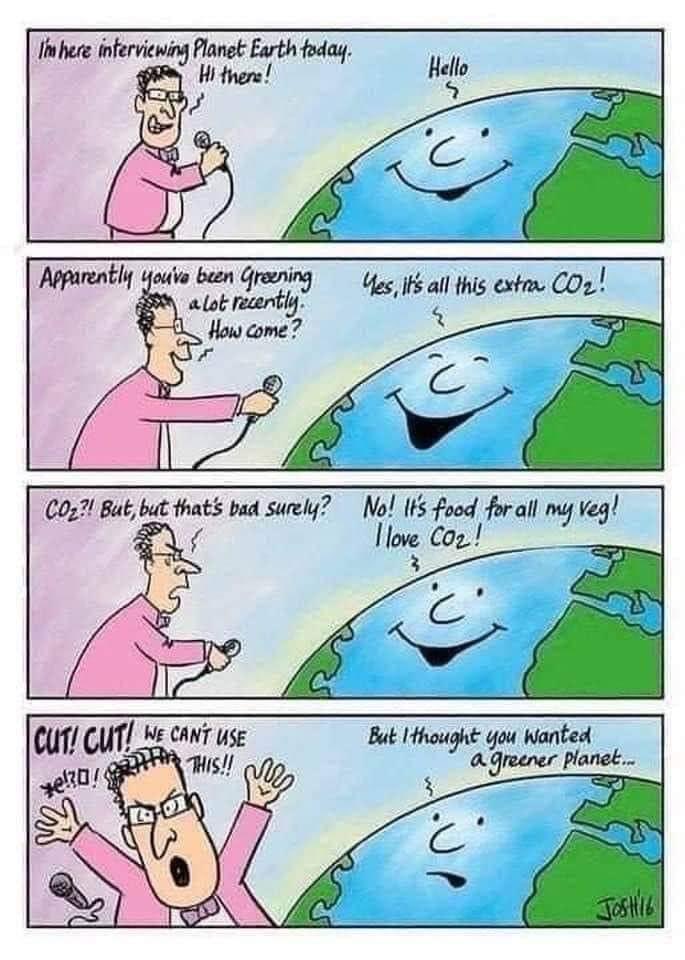 via Cartoons by Josh
via Cartoons by Josh
Recommended Sites


